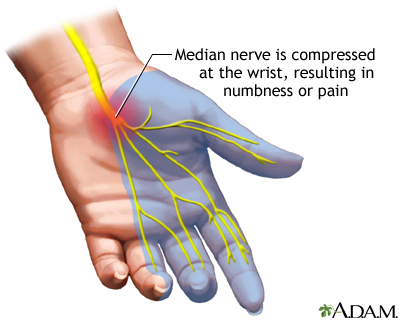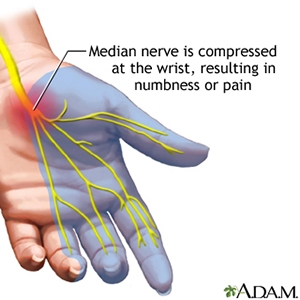Pain in your hands causes more than just physical discomfort as it can be frustrating to not be able to perform daily activities. There are a couple of common causes of pain in your hands that can easily be managed.
If you use your hands every day performing the same repetitive motions, any tingling and numbness in the hand is more than likely caused by carpal tunnel syndrome. Carpal tunnel syndrome is caused when there is pressure on the median nerve in the wrist that supplies movement and feeling from the thumb to the inner side of the ring finger. The most common culprit that causes carpal tunnel is typing, but you are also at risk if you regularly sew, drive, write, use vibrating hand tools, play an instrument, or play a sport using a racquet.
Your doctor can perform a physical examination as well as take x-rays of your wrist to rule out other problems and correctly diagnose carpal tunnel. There are several methods of treatment including wearing a split, taking anti-inflammatories, and even resting your hand. You may be able to reduce the pain by simply adjusting the position of your hand, such as moving your keyboard to a different angle. Severe cases of carpal tunnel syndrome will require surgery to provide relief. Your doctor will make an incision in your wrist and snip the ligament that is pressing your median nerve.

Another type of pain in the hand is degenerative arthritis of the thumb’s carpo-metacarpal joint or CMC. This can affect anyone, but it is more common for women in their early 50s. The articular cartilage of the joint becomes worn and degrades resulting in pain and stiffness. Initial treatment for CMC is usually non-surgical and consists of wearing a splint while taking oral anti-inflammatories. If that is no effective, a surgical procedure will remove the arthritic bone and reroute the tendons to provide a cushion between the thumb bone and the rest of the wrist.
It is important that you rest your hands when you begin experiencing pain and then see your doctor if the pain persists to determine your best course of action. Remember, our Dr. Jackson specializes in hand and upper extremities including endoscopic carpal tunnel release. This is a minimally invasive surgery that only requires a 3mm incision and results in less pain and a faster recovery.
Image credit:
http://www.ncbi.nlm.nih.gov/pubmedhealth/PMH0001469/






